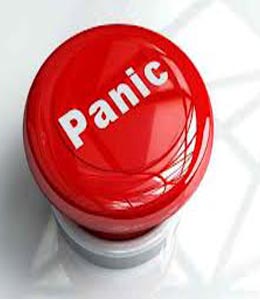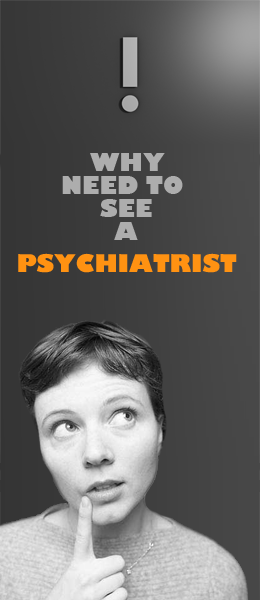PANIC DISORDER
Panic disorder is a condition where you have recurring panic attacks. Many people with panic disorder also develop agoraphobia. This means you avoid many places, and may not even go out from your home, due to fear of having a panic attack in a public place.
What is a panic attack?
A panic attack is a severe attack of anxiety and fear which occurs suddenly, often without warning, and for no apparent reason. In addition to the anxiety, various other symptoms may also occur during a panic attack. These include one or more of the following:
- Palpitations or a thumping heart.
- Sweating and trembling.
- Hot flushes or chills.
- Feeling short of breath, sometimes with choking sensations.
- Chest pains.
- Feeling sick, dizzy, or faint.
- Fear of dying or going crazy.
- Numbness, or pins and needles.
- Feelings of unreality, or being detached from yourself.
The physical symptoms that occur with panic attacks do not mean there is a physical problem with the heart, chest, etc. The symptoms mainly occur because of an overdrive of nervous impulses from the brain to various parts of the body during a panic attack.
During a panic attack you tend to over-breathe. If you over-breathe you blow out too much carbon dioxide which changes the acidity in the blood. This can then cause more symptoms such as confusion and cramps, and make palpitations, dizziness, and pins and needles worse. This can make the attack seem even more frightening, and make you over-breathe even more, and so on. A panic attack usually lasts 5-10 minutes, but sometimes they come in waves for up to two hours.
What is panic disorder?
At least 1 in 10 people have occasional panic attacks. If you have panic disorder it means that you have recurring panic attacks. The frequency of attacks can vary. About 1 in 50 people have panic disorder.
If you have panic disorder, you also have ongoing worry about having further attacks and/or worry about the symptoms that you get during attacks. For example, you may worry that the palpitations or chest pains that you get with panic attacks are due to a serious heart problem. Some people worry that they may die during a panic attack.
What causes panic attacks?
Panic attacks usually occur for no apparent reason. The cause is not clear. Slight abnormalities in the balance of some brain chemicals (neurotransmitters) may play a role. This is probably why medicines used for treatment work well. Anyone can have a panic attack, but they also tend to run in some families. Stressful life events such as bereavement may sometimes trigger a panic attack.
Panic disorder, agoraphobia and other fears
Some people with panic disorder worry about having a panic attack in a public place where it is difficult to get out of, or where help may not be available, or where it can be embarrassing. This may cause you to develop agoraphobia. About 1 in 3 people with panic disorder also develop agoraphobia.
If you have agoraphobia you have a number of fears of various places and situations. So, for example, you may be afraid to:
- Be in an open place.
- Enter shops, crowds, and public places.
- Travel in trains, buses, or planes.
- Be on a bridge or in a lift.
- Be in a cinema, restaurant, etc where there is no easy exit.
- Be anywhere far from your home - many people with agoraphobia stay inside their home for most or all of the time.
You may also develop other irrational fears. For example, you may think that exercise or certain foods cause the panic attacks. Because of this you may fear (develop a phobia) for certain foods, or avoid exercise, etc.
Dealing with a panic attack
To ease a panic attack, or to prevent one from getting worse:
- Breathe as slowly and as deeply as you can. Concentrate on breathing.
- Breathe into a paper bag. By doing this you re-breathe your own carbon dioxide. This helps to correct the blood acid level that had been upset by over-breathing which makes symptoms worse.
What is the treatment for panic attacks and panic disorder?
Treatment can help if you have recurring attacks (panic disorder). The main aim of treatment is to reduce the number and severity of panic attacks.
Antidepressant medicines
An antidepressant medicine is the usual treatment. These usually work well to prevent panic attacks in more than half of cases. They work by interfering with brain chemicals (neurotransmitters) such as serotonin which may be involved in causing symptoms of panic.
If it works, it is usual to take an antidepressant for panic disorder for at least a year. At the end of a course of treatment, you should not stop an antidepressant suddenly, but you should reduce the dose gradually under the supervision of a doctor. In about half of people who are successfully treated, there is a return of panic attacks when treatment is stopped. An option then is to take an antidepressant long-term.
Cognitive behavioural therapy (CBT)
This is a type of specialist talking treatment. It is probably the most effective treatment. Studies show that it works well for over half of people with panic disorder (and agoraphobia). A combination of CBT and antidepressants may work better than either treatment alone.

 PANIC DISORDER
PANIC DISORDER

